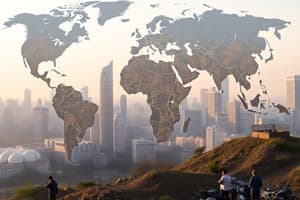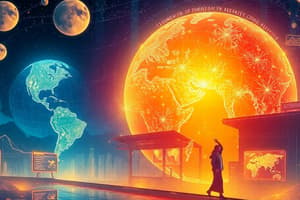Podcast
Questions and Answers
Which country was most advantageous during the first wave of globalization due to its capital and technology?
Which country was most advantageous during the first wave of globalization due to its capital and technology?
- Germany
- Britain (correct)
- France
- Spain
What technological advancement in the 1870s allowed countries like Argentina and Uruguay to thrive economically?
What technological advancement in the 1870s allowed countries like Argentina and Uruguay to thrive economically?
- The telephone
- The airplane
- The refrigerated cargo ship (correct)
- The steam engine
By 1900, which was the only independent country left in Africa as European nations scrambled for control?
By 1900, which was the only independent country left in Africa as European nations scrambled for control?
- Sudan
- Ethiopia (correct)
- Nigeria
- Libya
What was one severe consequence for workers in industrialized nations during the first wave of globalization?
What was one severe consequence for workers in industrialized nations during the first wave of globalization?
What event in 1914 ended the trend of globalization and high society in the West?
What event in 1914 ended the trend of globalization and high society in the West?
What global event led to a further breakdown of the economy between the world wars?
What global event led to a further breakdown of the economy between the world wars?
By the end of World War II, what percentage of world GDP was accounted for by trade?
By the end of World War II, what percentage of world GDP was accounted for by trade?
What marked a new beginning for the global economy after World War II?
What marked a new beginning for the global economy after World War II?
What is defined as the expansion and intensification of social relations across world-time and world-space?
What is defined as the expansion and intensification of social relations across world-time and world-space?
Which example illustrates the intensification of trading networks mentioned?
Which example illustrates the intensification of trading networks mentioned?
What signifies a future social condition characterized by thick interconnections and global flows?
What signifies a future social condition characterized by thick interconnections and global flows?
What ideology promotes a consumerist, neoliberal free-market world and is often embraced by powerful individuals?
What ideology promotes a consumerist, neoliberal free-market world and is often embraced by powerful individuals?
What happens to distance in globalization according to the submitted content?
What happens to distance in globalization according to the submitted content?
What is NOT a form of globalism mentioned in the content?
What is NOT a form of globalism mentioned in the content?
What role do social media and new technologies play in globalization?
What role do social media and new technologies play in globalization?
What term best describes the integration of culture and trade across boundaries as mentioned in the content?
What term best describes the integration of culture and trade across boundaries as mentioned in the content?
What is a characteristic of globalization 4.0?
What is a characteristic of globalization 4.0?
What impact has globalization had on the global population?
What impact has globalization had on the global population?
What threatens the progress of the digital economy under globalization 4.0?
What threatens the progress of the digital economy under globalization 4.0?
Which of the following is a negative effect of globalization as mentioned?
Which of the following is a negative effect of globalization as mentioned?
How have global exports trends changed recently?
How have global exports trends changed recently?
What perspective is 'globalism' promoting?
What perspective is 'globalism' promoting?
What was a major theme of Xi Jinping's speech in Davos regarding globalization?
What was a major theme of Xi Jinping's speech in Davos regarding globalization?
What consequence does pollution in one area pose in terms of globalization?
What consequence does pollution in one area pose in terms of globalization?
What is the primary function of the meso level in the context of the global economy?
What is the primary function of the meso level in the context of the global economy?
Which of the following accurately describes the role of core countries in the Modern World System?
Which of the following accurately describes the role of core countries in the Modern World System?
What was the significance of the Treaty of Westphalia in 1648?
What was the significance of the Treaty of Westphalia in 1648?
How did the economic motives of imperial powers influence modern globalization?
How did the economic motives of imperial powers influence modern globalization?
Which of the following elements is NOT necessary to define a state?
Which of the following elements is NOT necessary to define a state?
What does the term 'interstate system' refer to?
What does the term 'interstate system' refer to?
What challenge did the Westphalian system face following its establishment?
What challenge did the Westphalian system face following its establishment?
Which of the following is NOT suggested as a replacement for nation-states?
Which of the following is NOT suggested as a replacement for nation-states?
What is a primary characteristic of the contemporary international system as referenced in the content?
What is a primary characteristic of the contemporary international system as referenced in the content?
Which movement contributed to the emergence of the current understanding of Global South countries as active participants?
Which movement contributed to the emergence of the current understanding of Global South countries as active participants?
What is one of the imposed choices on nation-states due to globalization?
What is one of the imposed choices on nation-states due to globalization?
How does the European Union exemplify a change in how nation-states function?
How does the European Union exemplify a change in how nation-states function?
What does the establishment of international laws and principles primarily facilitate?
What does the establishment of international laws and principles primarily facilitate?
What is one of the key aspects of state sovereignty described in the content?
What is one of the key aspects of state sovereignty described in the content?
Which of the following is NOT mentioned as an effect of globalization on states?
Which of the following is NOT mentioned as an effect of globalization on states?
What concept emerged from the challenges faced by nation-states due to globalization?
What concept emerged from the challenges faced by nation-states due to globalization?
Flashcards are hidden until you start studying
Study Notes
Globalization Defined and Explained
- Globalization is a concept with multiple facets. It describes the expansion and intensification of social connections across space and time.
- Globalization is a process, creating new social networks and strengthening existing connections that transcend traditional boundaries such as political, economic, cultural, and geographical.
- Globalization affects not only objective material realms but also subjective human consciousness, creating a perception of a globalized world where distance is minimal.
- Globalization is often distinguished from globality and globalism. Globality refers to a future social condition marked by interconnectedness, while globalism represents an ideology emphasizing shared ideals and values that promote globalization.
Waves of Globalization
- The first wave of globalization, marked by the Industrial Revolution, witnessed the rise of a global economy driven by trade, technology, and financial integration.
- The Industrial Revolution led to economic growth in some countries but also generated inequality, exploitation, and environmental consequences.
- The first wave of globalization was disrupted by World War I and the Great Depression, which disrupted global trading networks and led to economic instability.
- The second wave of globalization began after World War II and was fueled by the rise of international institutions, technological advancements, and trade liberalization.
- This period witnessed increasing globalization, with significant growth in international trade and investment.
- The third wave of globalization emerged in the late 20th century and was characterized by the digital revolution, a surge in global communication and information exchange, and the rise of multinational corporations.
Globalization 4.0: New Frontiers and Challenges
- The fourth wave of globalization is characterized by a digital economy driven by e-commerce, digital services, and 3D printing, enabled by Artificial Intelligence.
- Globalization 4.0 faces challenges like cross-border hacking and cyberattacks, as well as environmental impacts from climate change and deforestation.
- Despite the benefits of globalization, it also faces backlash in the form of protectionism, trade wars, and anti-immigration sentiments, reflecting concerns about economic inequality and social instability.
Theoretical Frameworks
- Meso Level: Views the global economy as a system where countries compete in different product markets.
- Micro Level: Views the global economy as an arena where actors interact and influence each other.
- Modern World System (MWS): Developed by Immanuel Wallerstein, this theory explains the global economic interactions based on core, semi-peripheral, and peripheral countries.
- Core countries exploit those on the periphery, leading to a global system of economic inequality where wealthier countries benefit at the expense of others.
Role of the State in a Globalized World
- State sovereignty is a key aspect of global politics, with states having authority over their affairs.
- Globalization forces states to conform to neo-liberal economic principles of free markets, deregulation, and privatization to maintain development.
- Globalization leads to the formation of economic and political integrations, such as the European Union and NAFTA, which modify how states function within a wider context.
- Globalization also promotes the creation of international laws and principles, exemplified by the United Nations, which serves as a forum for resolving interstate disputes.
- Globalization further fosters the rise of transnational activism, where individuals and organizations act across national borders to address global issues.
The Westphalian System
- The Treaty of Westphalia (1648) established the concept of state sovereignty and the modern nation-state system, marking a turning point in international relations.
- The Westphalian system provided stability for European nations but was challenged by the French Revolution, which advocated for liberty, equality, and fraternity.
- Despite Napoleon’s challenge and the collapse of the Concert of Europe after World War I, the Westphalian system continues to influence the modern interstate system.
World-systems Perspective
- This perspective views the global system as a hierarchical structure with a core/periphery structure, leading to a concentration of power and wealth among certain nation-states.
- It emerged during the 1968 student uprising as a response to the Cold War and sought to highlight the experiences of the Global South (the "Third World") and their resistance to global power structures.
- The world-systems critique argues that colonialism and decolonization have shaped the global system and that the Global South has actively been involved in its own liberation.
Studying That Suits You
Use AI to generate personalized quizzes and flashcards to suit your learning preferences.




